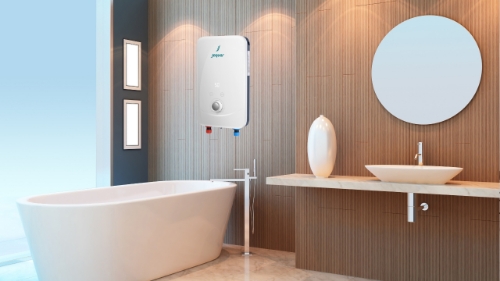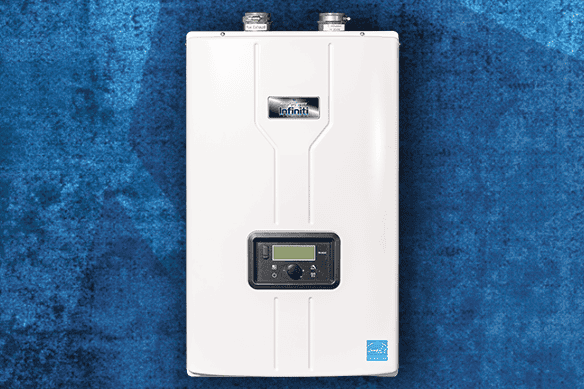Gaining More Value: The Upsides Of On-Demand Water Heaters
Gaining More Value: The Upsides Of On-Demand Water Heaters
Blog Article
What're your thoughts on Why You Should Consider a Tankless Water Heater?

In a globe where benefit and performance preponderate, it's not a surprise that homeowners are constantly looking for smarter methods to manage their home's energy consumption and comfort. One development that has actually continuously gained appeal is the tankless hot water heater. But exactly what makes these systems stand apart from the standard tank-based models the majority of us matured with? Allow's dive in and explore the advantages of tankless hot water heater, helping you make a decision if it's time to make the switch in your home.
Intro
Photo this: you step into the shower after a long day, expecting a comforting waterfall of hot water, only to be greeted by icy droplets because the last person utilized it all up. Noise acquainted? Conventional water heaters keep a set quantity of hot water, indicating you go to the grace of that container's supply. Tankless systems, on the other hand, heat water on demand. Say goodbye to going out mid-shower, say goodbye to fumbling with timetables simply to ensure warm water is offered.
Comprehending Tankless Water Heaters
What Are Tankless Water Heaters?
Tankless water heaters, often called on-demand or immediate water heaters, give hot water just as it's required. Rather than storing gallons of pre-heated water, these units kick into activity the moment you turn on the faucet. Water goes through a warmth exchanger, heating up in real-time, meaning you obtain an undisturbed flow of hot water without the requirement for a huge tank sitting idly by.
Exactly how Do They Vary from Conventional Equipments?
Traditional heating systems hold a tank of warm water, using power to maintain that container at a constant temperature level. Tankless devices eliminate the standing supply, lowering squandered power and the cumbersome footprint of a large cyndrical tube. Essentially, you're upgrading from a "accumulation" attitude to a "made-to-order" method.
Typical Kinds Of Tankless Devices
Tankless water heaters typically are available in two selections: gas and electrical. Gas versions tend to deliver higher flow rates, ideal for larger families, while electric designs usually offer smaller homes and are normally much easier to install. In addition, some systems are developed for point-of-use (serving one component) while others can manage the entire home's warm water requirements.
Trick Benefits of Tankless Water Heaters
1. Countless Warm Water Supply
Ever before had to arrange showers so everybody obtains their fair share of hot water? With tankless, that ends up being a thing of the past. As long as the heating unit's circulation capability isn't gone beyond, you can take back-to-back showers without turning into a popsicle.
2. Energy Effectiveness and Price Financial Savings
No more warming a titan tank's worth of water and maintaining it warm throughout the day. Tankless heaters minimize standby power losses, which can decrease energy costs. While the first price might be greater, the lasting financial savings often warrant the financial investment.
3. Space-Saving Style
If your home is short on storage, getting rid of the large storage tank frees up beneficial area. Tankless systems are small and can often be placed on walls, tucked away in corners, or installed in limited utility closets without hogging the whole area.
4. Longer Lifespan
A properly maintained tankless hot water heater can outlive its tank-based relative. Standard storage tanks could last 10-15 years, while tankless models can keep chugging along for 20 years or more, making them a solid financial investment with time.
5. Improved Water Quality
Storing water in a storage tank can occasionally bring about debris buildup or a slightly "off" taste. With tankless systems, fresh water is heated on the spot, reducing the chances of sediment accumulation and potentially offering cleaner-tasting water.
Factors to consider Prior To Switching
Though the advantages are engaging, it's smart to think about a couple of variables prior to completely committing.
Initial Financial Investment Costs
Tankless heaters generally feature a greater upfront price. Between the system itself and prospective installment adjustments, the first expense could give you sticker label shock. But keep in mind to watch it as a long-lasting financial investment.
Installation Demands
Depending on your home's facilities, you could need additional electrical capacity or gas line upgrades. Ensure you recognize the installment requirements and talk to a specialist to avoid surprises.
Assessing Your Home's Water Usage Patterns
If your home all at once makes use of several components with high warm water demand, make sure the unit's flow rate meets your requirements. Understanding your usage patterns aids you pick the best dimension and type of tankless heater.
Maintenance and Treatment Tips
Tankless systems are relatively low upkeep, however they aren't set-it-and-forget-it home appliances.
Regular Cleansing and Descaling
Difficult water minerals can build up in the warm exchanger, affecting efficiency. Regular descaling (frequently advised yearly) maintains the unit performing at peak performance.
Yearly Professional Assessments
A yearly checkup from a professional makes sure small concerns are caught early. They'll examine the system's efficiency, try to find leaks, and aid preserve optimal performance.
Guaranteeing Correct Air Flow
For gas models, appropriate ventilation is essential to safely get rid of exhaust gases. See to it venting systems are tidy and correctly set up to stop any potential safety dangers.
Contrasting Different Brands and Designs
Not all tankless hot water heater are produced equal.
Researching Reputable Producers
Look for reliable brand names with a background of creating quality units. A dependable manufacturer usually supplies better customer assistance and longer warranties.
Reviewing Evaluations and Customer Feedback
Individual testimonials and comments from neighbors or friends that have actually gone tankless can supply beneficial insights. Sometimes, real-life experiences can be extra telling than marketing sales brochures.
Installment: DIY or Expert?
While some home owners cherish taking on projects themselves, tankless setup could not be the very best time to burst out the toolbox.
Benefits and drawbacks of DIY Setup
A DIY set up might save cash, yet it features threats. Inaccurate setup can bring about inadequacy or security worries. If you're handy and have experience, it might be viable-- however wage caution.
When to Call a Professional Plumber
For the majority of, calling a pro guarantees whatever's done properly. An expert plumbing technician comprehends local codes, sizing requirements, and airing vent criteria, lowering the threat of incidents.
Maximizing Performance
You've purchased a tankless device-- now maximize its performance.
Optimum Temperature Settings
Most people set their devices between 120-140 F. Changing the temperature level can boost comfort and cost savings. Experiment to find a wonderful place that doesn't lose energy.
Coupling With Low-Flow Fixtures
Wish to extend your device's capabilities? Take into consideration installing low-flow showerheads and faucets. They lower water usage, enabling your tankless system to provide a constant stream of hot water without straining.
Ecological Influence
Tankless water heaters align with greener living goals.
Decreased Carbon Footprint
By utilizing much less power and just home heating water as required, tankless systems can reduce your home's carbon impact, lowering your environmental effect.
Preserving Natural Resources
Less power intake and less thrown away hot water translate into less natural deposits being made use of, an environmental win-win.
Who Profits Many from Tankless Heating systems?
The elegance of tankless heating systems is that they can suit a variety of families.
Big Family Members vs. Single Residents
Big family members could like the limitless warm water supply, while solitary passengers value the energy savings from not heating up an entire storage tank for just one person's morning shower.
Property Owners with Restricted Area
If your home is short on square footage, losing the large storage tank frees up space for various other fundamentals-- or perhaps just more elbow room.
Eco-Conscious Consumers
Going tankless aligns with environmentally friendly values, ensuring you're not throwing away power or resources.
Future Trends in Tankless Water Heaters
The globe of home appliances is ever-evolving, and tankless hot water heater are no exception.
Smart Home Integration
Picture readjusting your hot water heater's temperature by means of an app or getting upkeep alerts on your phone. As clever home tech breakthroughs, we'll see more connection and convenience.
Advancements in Modern technology
R&D is continuously boosting heat exchangers, making units a lot more reliable and durable. Future models might be also quieter, a lot more small, and much better suited for varying environments.
Final thought
Picking a tankless hot water heater is greater than simply updating your home's warm water system; it's buying long-term comfort, energy efficiency, and a greener way of living. By considering your house's water use, being mindful of installation requirements, and committing to normal upkeep, you can take pleasure in a consistent stream of warm water without the baggage of a cumbersome storage tank. As innovation evolves, you can look forward to also smarter, a lot more effective tankless solutions that not only make your life simpler yet likewise benefit the earth.
Why You Should Consider a Tankless Water Heater for Your Home
Energy Efficiency and Cost Savings
Tankless water heaters, also known as on-demand water heaters, heat water only when needed. This means they don't waste energy keeping a tank of water hot constantly. This efficiency translates into substantial cost savings on your monthly energy bills.
Endless Hot Water Supply
One of the significant advantages of tankless water heaters is their ability to provide a continuous supply of hot water. Traditional tank water heaters have a limited capacity and can run out of hot water, especially during peak usage times. In contrast, tankless water heaters can provide an endless stream of hot water, making them ideal for larger families or homes with high water usage.
Space-Saving Design
Tankless water heaters are compact and take up significantly less space compared to traditional tank heaters. They can be installed on walls, under cabinets, or even outside, freeing up valuable space in your home. This makes tankless water heaters a great option for smaller homes or properties with limited space for a traditional water heater.
Longer Lifespan and Lower Maintenance
Tankless water heaters typically have a longer lifespan compared to traditional tank heaters. They can last up to 20 years or more with proper maintenance. Additionally, tankless systems are designed with replaceable parts, which can extend their lifespan further and reduce long-term maintenance costs.
Environmentally Friendly
Reducing energy consumption not only saves you money but also benefits the environment. Tankless water heaters contribute to a smaller carbon footprint by using less energy to heat water. Their energy efficiency and ability to minimize standby heat loss make them an eco-friendly choice for environmentally conscious homeowners.
Customized Temperature Control
Tankless water heaters offer precise temperature control, allowing you to set the desired temperature to meet your specific needs. This level of customization ensures you always have water at the perfect temperature for your comfort and usage requirements.
https://beantownservices.com/blog/consider-tankless-water-heater-for-your-home

I recently found that content on 5 Benefits of Tankless Water Heaters while browsing the web. Sharing is caring. Helping people is fun. Thank you for taking the time to read it.
See Availability Report this page